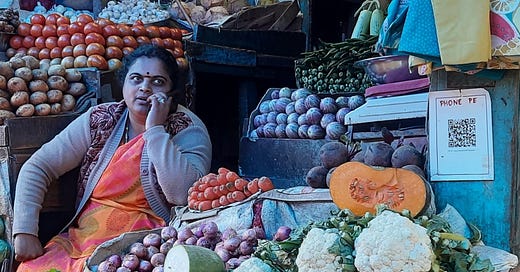“Nothing new, no NUE”, says RBI!
The financial year ended with another record high in UPI payments in March - 8.7 billion transactions worth Rs 14.10 trillion with retail payments dominating at 55.57% the volume. Indians continue to choose UPI for small ticket transactions – with 84% of the merchant payments less than Rs 500 in value. The UPI platform is being expanded - NPCI issued guidelines for Prepaid Payment Instruments (PPI) wallets to be part of the interoperable UPI ecosystem from 1st April 2023 and the RBI has proposed enabling transfer through UPI for pre-sanctioned credit lines from banks. Both these announcements created a buzz in the digital payments market.
The IMF has released a working paper detailing India’s incredible digital journey, with lessons for other countries. While we should be proud of all that has been achieved so far, one of the challenges listed ahead to overcome is to address the digital divide that appears along “familiar geographic, gender and income lines”, reminding us that there is so much more to do to cover the remaining gaps in financial inclusion.
Even as NPCI has eased digital payments for the masses, there are still some gaps in basic media communication. The 1.1% interchange fees on PPI wallets for UPI transactions above Rs 2000 was misconstrued by many as fees to be paid by customers, leading to a storm in social media – NPCI had to issue a clarification that customers will not have to bear any charges. The industry feels this is a good step forward as it has rationalized the interchange for P2M wallet based transactions and players like Paytm Payments Bank have welcomed this move, but there are voices that continue to ponder over the fundamental question of who actually bears the cost of these transactions.
Here competitive forces can help grow, and also induce the necessary market discipline in a sector dominated by a monopoly player. As we understand it, the New Umbrella Entity framework envisaged greater competition in the payments infrastructure system. However, despite receiving proposals from six consortiums, the RBI appears to be backtracking, and it has recently made clear that NPCI will continue its monopoly in the digital payments ecosystem. As quoted in the press, T Rabi Sankar, Deputy Governor, RBI said - "The objective was to introduce an innovative infrastructural value-added facility into the system, our digital ecosystem is already quite active and innovative, we just wanted to bring in new ideas...We did not want something that is either incremental or a substitute for existing ideas or technologies. Of the proposals that we have received, we did not see any innovative solution that had come up. So that's where it lies." This is an interesting point, given that maybe this is the first time the RBI has given a reason behind its licensing decisions? We don't understand this and would like greater clarity from the RBI. Innovation, we believe, is an outcome of healthy competition, not a precondition.
Do follow our Indicus Centre for Financial Inclusion page on Linkedin to continue the conversation. Read on here for more of the latest news and views on financial inclusion in India, thanks!
Parul Tandon, MicroSave has explained their DEBIT framework, unpacking women’s choice of channels for financial transactions.
Sophie Sirtaine and Yasmin Bin-Humam, CGAP wrote on addressing the challenges in digital divide for women.
Dvara Research released a report on Social Protection Open Digital Ecosystems (SP-ODEs) using a framework that puts citizen centricity at its core.
PayNearby released the second edition of its report on assisted financial transactions titled ‘Retail-O-Nomics’.
PhonePe has launched a new app Pincode, part of Open Network For Digital Commerce (ONDC) framework, which will focus on hyperlocal commerce
Aishwarya Narayan and Srikara Prasad, Dvara Research presented their observations about the user interface of In-App grievance redressal mechanisms in UPI applications.
Srikanth Subramanian, Kotak Cherry has written an incisive piece on fintechs in India, their future.
PhonePe kicks off digital lending pilots.
Aishwaraya Narayan, Dvara Research collated evidence of the various reasons that prevent the BC network from offering access to reliable CICO services in India.
CASHe released insights from its report, Financial Mood of the Millennials 2022-23.
Laura Brix Newbury and Mehmet Kerse, CGAP, summarized an initial review of consumer risks faced by crypto users in emerging markets and the need to address these risks in financial consumer protection frameworks.
Shri M K Jain, Deputy Governor, RBI, delivered a speech on “The FinTech Revolution in India- Innovation, Inclusion and Regulation” on March 10, 2023.
Supriya Sharma and Trisha Ghoshal, CIIE. CO wrote on making space for gender-intentionality towards financial inclusion for women.
Kalpana Ajayan, Women's World Banking wrote an indepth piece in India Development Review on how women can be made active users of banking.
Basudha Das, Business Today delved into the challenges of bridging India's digital gender gap.
PayNearby released an excellent insight filled study in association with Reserve Bank Innovation Hub (RBIH) - the PayNearby Women Financial Index (PWFI) is an annual Pan-India report showcasing financial consumption by women at retail stores.




